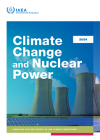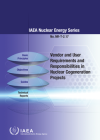Regardless of whether a country already has an existing nuclear power programme or is developing nuclear power for the first time, new nuclear power plants need sufficient funding – usually the responsibility of the government – and financing, which is the responsibility of the plant’s owner or operator.
Funding and finance
Whether a country already has an existing nuclear power programme or is developing nuclear power for the first time, it needs government funding to develop or maintain the necessary nuclear infrastructure. This includes establishing the legal framework, the regulatory body and the organization implementing the nuclear energy programme; supporting the development of human resources; preparing for emergency contingencies; and developing funding mechanisms for radioactive waste disposal and the decommissioning of nuclear facilities.
On the other hand, securing financing for new nuclear power plant projects is typically the responsibility of the owner or the operator of the nuclear power plant. Although they have relatively low and stable operating costs, nuclear power plant projects can be a challenge, considering that capital costs are high and usually combined with very large project sizes. This means that the scale of financing required for even a single project is substantial.
The IAEA supports Member States that are pursuing new nuclear power plants by providing a roadmap for developing the necessary infrastructure and tools for modeling and acquiring the needed funding and financing. The IAEA Milestones Approach, documented in Milestones in the Development of a National Infrastructure for Nuclear Power, aims to help Member States understand the commitments and obligations associated with developing a nuclear power programme, including the associated funding and financing. The IAEA also publishes financial management reports, for instance on Financing of New Nuclear Power Plants.
In particular the financing of nuclear power projects has become more challenging in the last three decades. On the utility side, quasi-monopolistic markets have been deregulated and energy transmission, distribution and generation unbundled to encourage competition among electricity generators. This exposes nuclear operators to price and demand risk, which increases the overall risk of new projects and increases the difficulty of obtaining financing. To encourage nuclear development despite these difficulties, innovative approaches to financing and support policies are being pursued, including partial investment or loan guarantees from the government.
On the financial markets side, international capital markets have become increasingly global and competitive. A variety of new financial instruments have been developed to better ensure returns on investments and attract investors to specific projects, such as phased financing to mitigate risk across the different phases of the project, from construction to adding additional units.










